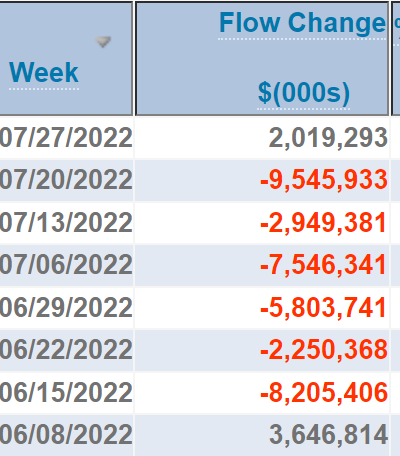I have a small $ amount in the Rockefeller Climate Solutions Fund, which they set up from their LLP that has been running for several years. The Rockefeller foundation and family office have dumped XOM etc and are trying to make up for John D's creation of the global oil industry.
As the press release below indicates, the fund is run by the Asset Management company. I don't know what the role of "Trust for Professional Mangers" is although there are a lot of other funds, some pretty well known on that list
https://www.businesswire.com/news/home/20210923005097/en/Rockefeller-Asset-Management-Launches-Climate-Solutions-Fund-Expanding-Audience-for-Strategy-with-9-Year-Track-RecordRockefeller Asset Management Launches Climate Solutions Fund, Expanding Audience for Strategy with 9-Year Track Record
September 23, 202
1 08:00 AM Eastern Daylight Time
NEW YORK--(BUSINESS WIRE)--Rockefeller Asset Management (RAM), a division of Rockefeller Capital Management, recently launched the Rockefeller Climate Solutions Fund (RKCIX), seeking long-term capital growth by investing in companies focused on climate change mitigation or adaptation solutions across the market capitalization spectrum. The Fund, which launched with nearly $
100mn in assets and several underlying investors, was converted from a Limited Partnership structure with the same investment objective and a 9-year track record. In addition, the firm has partnered with Skypoint Capital Partners as the Fund’s third party wholesale marketing agent.
“Climate change is becoming a defining issue of our time. We believe investors can generate alpha and positive outcomes by investing in companies producing climate mitigation or adaption solutions with distinct competitive advantages, clear growth catalysts, strong management teams, and attractive earnings potential.”
RAM, in collaboration with The Ocean Foundation (TOF), established the Climate Solutions Strategy nine years ago based on the belief that climate change will transform economies and markets through changing regulation, shifting buying preferences from next-generation consumers, and technological advancements. This global equity strategy deploys a high conviction, bottom-up approach to investing in pure-play companies with meaningful revenue exposure to key environmental sectors such as renewable energy, energy efficiency, water, waste management, pollution control, food & sustainable agriculture, healthcare mitigation, and climate support services. The portfolio managers have long believed that there is significant investment opportunity in these public companies producing climate mitigation and adaptation solutions and that they have the potential to outperform broader equity markets over the long-term.
Rockefeller Climate Solutions Fund is co-managed by Casey Clark, CFA, and Rolando Morillo, who lead RAM's thematic equity strategies, leveraging the intellectual capital built from RAM's three decades of Environmental, Social & Governance (ESG) investing experience. Since the inception of the Climate Solutions Strategy, RAM has also benefited from the environmental and scientific expertise of The Ocean Foundation, a non-profit dedicated to conserving ocean environments around the world. Mark J. Spalding, the President of TOF, and his team serve as advisors and research collaborators to help bridge the gap between science and investing and contribute to the strategies, idea generation, research, and engagement process.
Rolando Morillo, Fund Portfolio Manager, says: "Climate change is becoming a defining issue of our time. We believe investors can generate alpha and positive outcomes by investing in companies producing climate mitigation or adaption solutions with distinct competitive advantages, clear growth catalysts, strong management teams, and attractive earnings potential."
“RAM has been committed to continuously reinvesting in its investment team and ESG-integrated platform to support significant demand for its strategies, including thematic offerings like Climate Solutions, globally. The original LP structure was designed for clients of our family office. After nearly a decade, we are excited to make the strategy accessible to an expanded audience through the launch of our 40 Act Fund,” said Laura Esposito, Head of Institutional and Intermediary Distribution.
